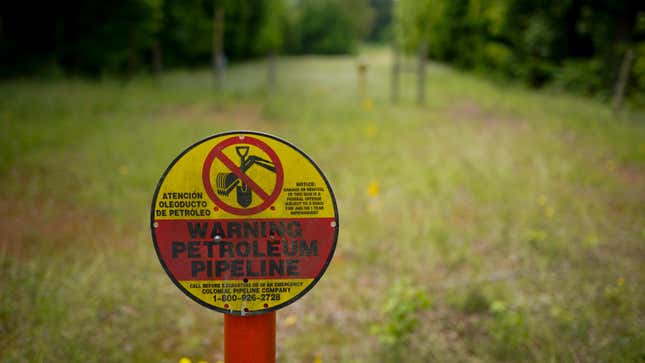
There’s more trouble with the Colonial Pipeline: The nation’s largest gasoline pipeline reported a spill in Tennessee in early July, adding onto more than a year of public problems with the company, from a catastrophic hacking to being responsible for the largest gasoline spill in decades.
According to the company, a valve failure spilled more than 24,000 gallons of gasoline in Loudon, Tennessee; the spill was discovered July 4 by workers responding to reports of a gas smell. That stretch of pipeline was shut down and the valve repaired, but on July 11 Colonial said that gasoline had been discovered outside of the company’s property line. The company said it is still in the “investigative stage” of figuring out the extent of the spill and is monitoring air and waterways for pollution.
If the name “Colonial Pipeline” sounds familiar, that’s because Colonial made a lot of headlines last year. In May, the company was the victim of a cyberattack from ransomware group DarkSide that forced it to shut the pipeline down. (Both the company and the pipeline, which was built in 1963, are named “Colonial.”) Colonial is the largest gasoline pipeline in the U.S., stretching from Texas to New Jersey, and pumps 2.5 million barrels of gas per day; shutting off the pipeline that supplies 45% of the East Coast’s gasoline for several days caused, to put it mildly, a bit of a ruckus. Despite the company’s whopping profits, it was going cheap on its cybersecurity: A tech audit conducted three years before the hack found that “an eighth-grader” could have broken into Colonial’s system. Colonial ended up paying the hackers a ransom (with mixed results) to get the pipeline back online.
While that may seem like enough trouble for one company to find itself in for a year, Colonial was also dealing with other—arguably much more serious—matters. In November, the state of North Carolina sued Colonial over the largest gasoline leak in the U.S. in decades, which was discovered in August 2020 outside the city of Huntersville. In its lawsuit, the state claimed that Colonial basically kept North Carolina’s Department of Environmental Quality in the dark about the scale of the accident and didn’t provide accurate updates on the damage or cleanup. To date, Colonial has cleaned up more than 1.4 million gallons of gasoline from the Huntersville site.
The recent accident in Tennessee, volume-wise, is nowhere close to the millions of gallons spilled in North Carolina. But it’s worth remembering that Colonial initially reported that the spill in Huntersville was just 63,000 gallons, gradually inching up its estimates over months while keeping its cleanup operations relatively hush-hush. Huntersville officials told local outlets in August 2021, a year after the spill’s discovery, that they hadn’t had an update on the cleanup in “months.” In November—15 months after the spill was initially discovered—the Department of Environmental Quality said in its complaint that Colonial still hadn’t provided it with an update of how much gas was left to clean, despite at that point already recovering more than 1.2 million gallons.
Late last month, Colonial and North Carolina both agreed to a consent order, which went into effect last week, that mandates the company pay almost $5 million for its role and take special remedial actions, including monitoring water and bedrock. (That $5 million seems like chump change, considering that Koch Industries, the pipeline’s biggest shareholder, made $85 million in dividends from the pipeline in 2016 alone.) The company has also created a website on the Tennessee spill that it says it will be updating.
The Colonial CEO said last year that he’d prefer no one knows a thing about his company and that the pipeline just be left in anonymity to generate profits for its shareholders. But with the huge number of fuckups the company has had recently, it might be a good idea for residents of Tennessee to familiarize themselves with Colonial—just in case the leak gets worse.